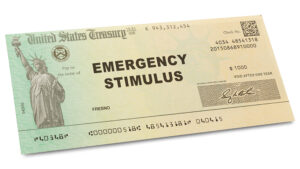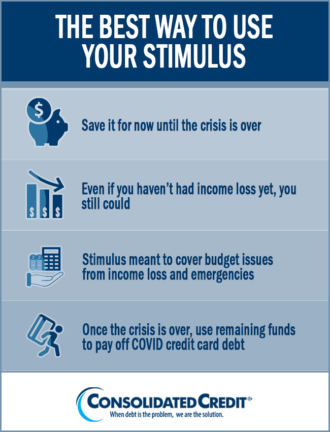Making sure the money you receive helps you get through the crisis.

On March 27, 2020, Congress and the White House passed a historic $2 trillion economic stimulus package to help American workers and businesses get through this crisis.[1] A big part of that money will be divvied up and sent directly to individuals and families. Here’s what you can expect to receive, along with tips on the best way to use your stimulus check.
How much can I expect to receive?
Stimulus checks are being given out based on need, both by income and the size of your household. If you’re a single parent or married couple with kids, you receive more money than an individual without kids. If you’re a high-income earner, you will get a smaller check than someone with low income or you won’t get a check at all.
| Household | Annual Income | Size of Stimulus |
|---|---|---|
| Individual | Up to $75,000 | $1,200 |
| Individual | Up to $99,000 | Less than $1,200 |
| Married Couple | Up to $150,000 | $2,400 |
| Married Couple | Up to $198,000 | Less than $2,400 |
| Head of Household | Up to $112,500 | $1,200 |
| Head of Household | Up to $136,500 | Less than $1,200 |
| Each child in the household, under the age of 17 | Additional $500 |
Let’s say you’re a single parent that makes $102,000 per year and you have two young children in your home. You would receive $2,220 for your individual stimulus as a head of household then plus $500 for each child.
What is “Head of Household” and can I claim it?
Head of Household is a status that you claim on your annual income tax returns. According to the IRS, someone can file as head of household if they are unmarried, paid more than half the cost of keeping up the home for the year and a qualifying dependent lived with you for at least half the year.[2]
Being Head of Household doesn’t get you a bigger check, but it does increase the annual income allowable to receive the full $1,200 check. However, you must claim Head of Household on your taxes in order to qualify.
How will I receive my stimulus check?
The government is going to use existing agencies and payment channels to make distributing the money as easy as possible.
If you file annual income tax returns through the IRS…
You will receive your money the same way you receive your tax refund. If you get your refund via Direct Deposit, your stimulus check will arrive the same way to the same bank account. If you have your refund mailed to you, then your stimulus check will go to the same address.
The IRS will distribute the funds to the account or address that they have on file. If you haven’t yet filed your 2019 tax returns, they’ll use the information from your 2018 returns.
If you have moved or changed bank accounts since your 2018 return, then you should file your 2019 return as soon as possible so they have your current information.
If you don’t file income tax returns but receive social security or SSI…
People who receive Social Security or SSI payments through the Social Security Administration may not file taxes. In this case, your stimulus check will be delivered the same way your social security payments arrive. This may be by Direct Deposit or by physical mail to your home address.
When will the money arrive?
U.S. Treasury began distributing checks in mid-April, sending roughly 80 million payouts in the first round. Some of those who have direct deposit set up for their tax refunds have already received their stimulus.
However, experts warn that some people may have to wait until early September to receive their funds. This is especially true if you receive your stimulus through physical mail instead of direct deposit.
The government has plans to set up a website where you can check on the status of your stimulus check. However, the website is not up and running just yet.
What’s the best way to use my stimulus money?
“It’s good that the government stepped in to provide some relief for Americans,” says Gary Herman, President of Consolidated Credit. “However, when you think about it, the money you receive may not go very far depending on your circumstances. It’s crucial to make sure you’re making the funds stretch as far as possible.”

Stimulus FAQ
Cover groceries that you need or costs if something crucial in your house breaks. If you and your household need it to survive, it’s a wise use of your money.
But try to avoid using the money you receive to panic purchase. That’s where you over-buy things like toilet paper or canned goods that you may not even need, depending on the length and limitations of quarantines where you live.
We usually encourage people to use extra cash you receive to make extra payments on your credit cards. However, in this situation, don’t do that immediately!
Put on your stimulus into savings until you need to use it to cover necessities. Keeping it your savings account will help ensure it’s doesn’t get spent until it’s absolutely necessary.
If you’re working from home and don’t foresee any changes in your employment situation, you may feel comfortable using your stimulus for other purposes. Don’t!
Even if you have a steady income with a full paycheck now, you can’t know for certain that will last. You may face layoffs, pay cuts or reduced hours before stay-at-home orders finally end.
You should plan for the worst in this case and save your stimulus in case you have an income change you didn’t anticipate.
Many Americans are being forced to use credit cards to cover necessities while they wait for stimulus relief. You may be using credit cards to cover increased grocery costs, emergencies or even bills.
When quarantines and stay-at-home orders end, paying off those charges would be a good use of leftover stimulus funds. This crisis may have significant and long-term effects on our economy. We could be headed for a recession. If so, you want to minimize debt as much as possible.
If you have questions about your budget or debt during this time, we can help.
